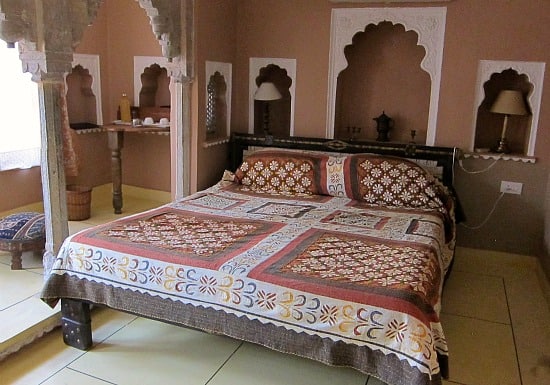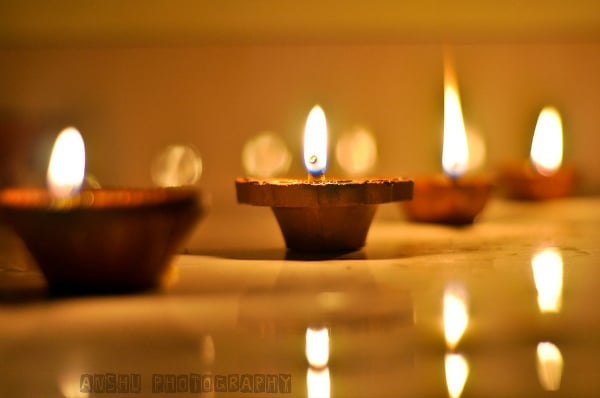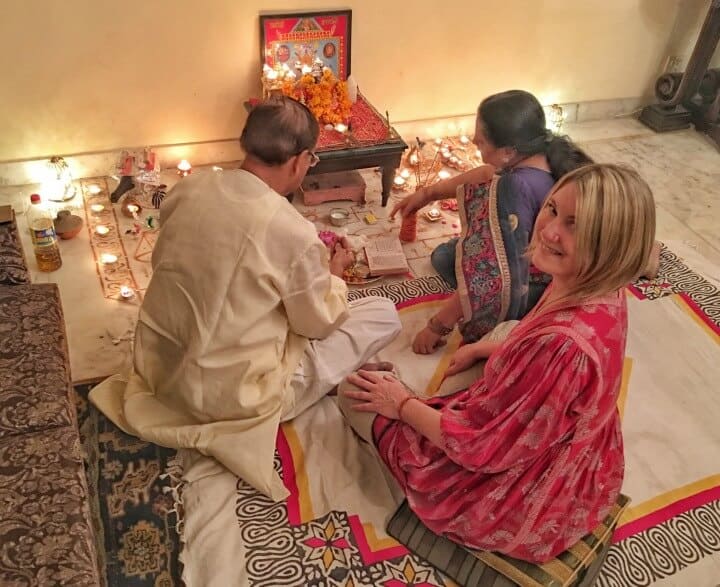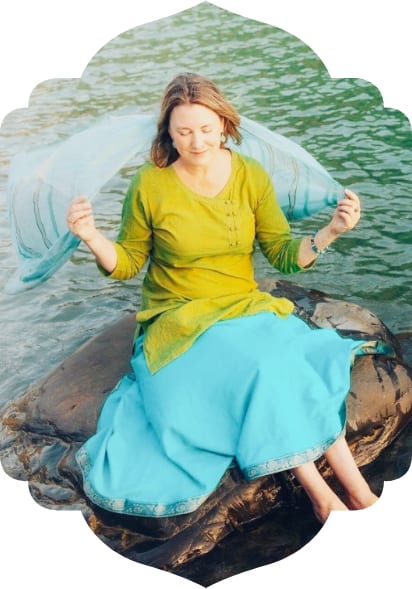 Zostel pioneers a new concept in a hip, fun, luxury hostel chain in India and Asia
Zostel pioneers a new concept in a hip, fun, luxury hostel chain in India and Asia
FINDING CLEAN, FRIENDLY, cheap accommodation in India can be a challenge. It’s a hit-and-miss affair that can go remarkably well … or … not well at all, depending on recommendations, luck and maybe karma. There are lots of soulless budget hotels and lots of charming but one-off guest houses and homestays. But you never know what you’re going to get. The gap in the market is the luxury hostel chain.
Unlike Europe and other well-travelled parts of the globe, India has not had a hostel tradition. In India, the concept of a hostel is actually pretty dire: a decrepit building of small, dingy rooms for students or civil servants. Zostel is changing all of that. Zostel hostels are hip, affordable, comfortable and at the upper end of the luxury hostel experience when you stay in one of the private rooms.
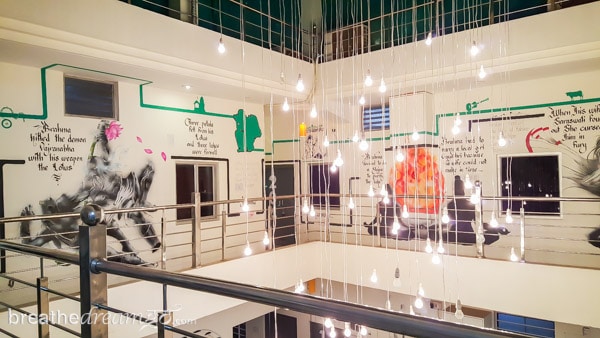
The Delhi-based company is in the midst of an ambitious expansion plan, with 12 Zostel Hostels already opened and about 13 more to go. Most are in India, but they are also expanding into Sri Lanka and Vietnam.
I stayed as a guest of Zostel for more than a week in a private room at the newly opened hostel in Pushkar, during the annual Camel Fair. And while I may not be the company’s ideal target market — 20-something backpackers — I found the experience to be wonderful in almost every way. And while there I met Leslie, an American female solo traveller who agreed with me — and she is 75 years old!
For me, the essentials were in place: cleanliness, a really comfortable bed, a nice bathroom with a good, hot water shower, a sunny window and good WiFi. The extras in-room were a lamp on a dimmer switch (almost unbelievable in India), a thick, quilted mattress cover, like a pillow top (again, almost unbelievable in a hostel) and a spacious, airiness that I truly cherish.
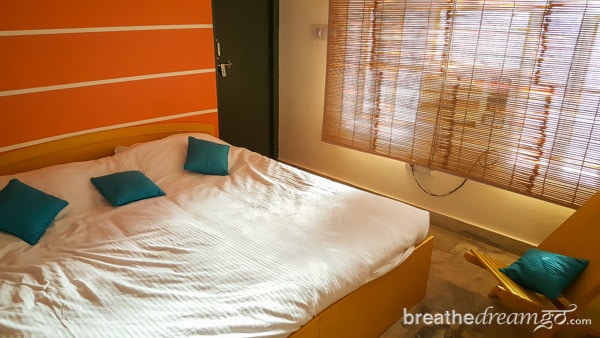
The other extra is a big one, and the defining characteristic of Zostel: the atmosphere. The Pushkar hostel is designed around an airy atrium with a comfortable common area full of sofa-mattresses and bean-bag chairs. Upstairs is a funky, airy cafe in bright colours. And up on the roof is an open-air lounge with a reading library. Zostel is smoke-free, but smokers can indulge there on the lounge (so this is the one place I avoid, as I can’t tolerate cigarette smoke).
Throughout the hostel, the use of white, bright colours and bold murals adds to the upbeat, relaxed and creative atmosphere that appeals to me so much. Around the first floor atrium, murals tell the story of Pushkar — how Brahma dropped a lotus leaf here to create the lake and got in trouble with his wife Savitri when he married Gayatri for religious reasons. Pushkar is notable for being the site of the only Brahma temple in India (or one of the only Brahma temples in India, depending on who you listen to).
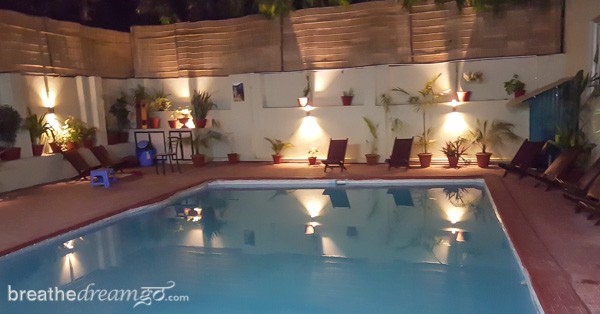
Comfort, community, creativity
It’s this combination of common area, creativity, comfort, plus the relaxed attitude of the management, that makes Zostel such a welcoming, friendly and chilled environment. And while each Zostel hostel is architecturally unique and reflects the local culture, travellers can rely on standardization and quality control throughout the chain.
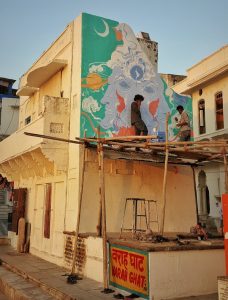
But there’s even something more — it’s the commitment to the traveller experience, to supporting creativity and fostering community that I admire perhaps the most. The company holds traveller talks with bloggers, and employs professional street artists to decorate hostel interiors. Here in Pushkar, they even employed street artists to create spiritually inspired murals throughout the town. The Pune Street Artists created four murals and Arvi, from Bangalore, created the Brahma mural on Varah Ghat while I was in Pushkar. In fact, I was at the ghat when he finished and climbed down from the scaffold. I noticed the local people, very steadfast in their reverence for the sacredness of the lake, embraced the painting with enthusiastic approval.
So not only are the Zostel people hip … they’re also respectful, too, and sensitive to local culture. Which seems like the sweet spot to me.
They also know how to throw a party. On the Saturday night of the Pushkar Camel Fair, Zostel invited gypsy musicians, dancers and a fire breather to entertain residents and guests. They also served local snacks and chai. The evening culminated in a fun dance party, where everyone jumped up and danced to the catchy beat.
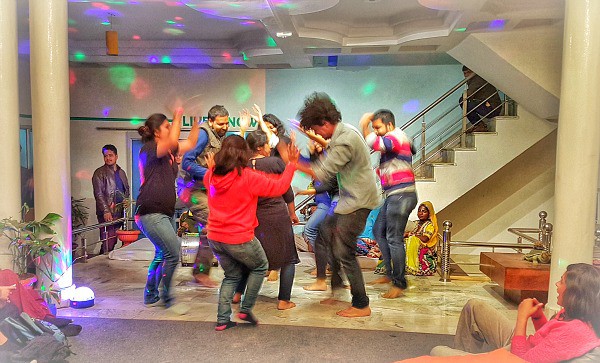
However, hostels may not be for everyone …
The hostel experience, even at a high-end chain like Zostel, is probably not for everyone. I met a middle-aged Indian couple who stayed at Zostel because of over-crowding in Pushkar during the Camel Fair and they found it lacked amenities, compared to hotels. It’s true there are no telephones in the rooms, though there are televisions, for example. But I never felt I lacked for anything.
Personally, however, I found the noise level quite high at times — and, again, this would not be a problem for some people. But for people who want to sleep early, or who enjoy quiet when they’re indoors — because India is so noisy outdoors — a hostel may not be the right choice. Also, the common areas were often messier than I would expect in a good hotel, though again, this relaxed attitude would not bother some. In fact, some people would probably welcome it.
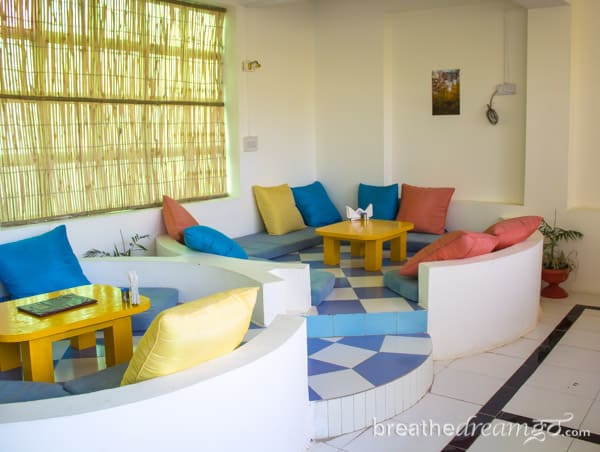
Hostels are often designed and marketed to the youth market, but I think it’s more about attitude than age. Even young people in hippie attire are not always the perfect hostel guests. One morning at breakfast — on the busiest day of the Pushkar Camel Fair — the Zostel Cafe was slammed with customers. I watched a group of four European 20-somethings with shaggy hair, beads and shirts covered in Om symbols berate the staff for tardiness. They were saying things like “you should be able to keep up with the demand” and “we just wasted two hours here.”
East meets west
I spent about an hour thinking about their attitude. Over the years, yoga studies and travel in India has exposed me to a new way of thinking and being in the world. One of the most valuable things I’ve learned is to accept things as they are. This use of the word “should” seems like an anachronism when you are deeply rooted in “what is.” Likewise the idea of wasting time. The young man who said this was relaxing on cushions with his friends on a sunny Sunday morning. If he had an attitude of gratitude, he would have seen the time as a gift.
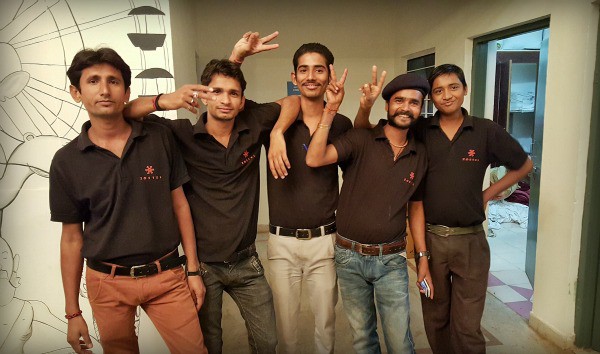
There is a big difference between people who see life as a “right” and those who see it as a “privilege.” I find many people in India have the latter attitude, which makes them more grateful, accepting, content and willing to “adjust a little.” This is one of the main reasons I enjoy travel here. Author Eric Weiner wrote a brilliant piece for BBC Travel called “India’s chaotic lesson in letting go” which perfectly captures the journey many travellers in India experience, of learning to surrender to the moment, and go with the flow.
There’s also a difference between people who believe they only have one life to live, and must work hard to make their mark, and people who have an almost-infinite conception of time and who believe in reincarnation. The Indian mythologist and writer Devdutt Pattanaik spoke about this at a TED talk in Mysore, and it’s worth a watch as it beautifully explains one of the key differences between the western and eastern mindsets.
Devdutt Pattanaik on east and west
But this is really a topic for another blog post. In the meantime, to learn more about Zostel, find a list of locations and book, check the Zostel website. My next blog post will be about Pushkar, the Camel Fair and The Sacred Pushkar cultural festival. Stay tuned!
NOTE: I was a guest of Zostel Hostel and in Pushkar for the Camel Fair to help promote the new location. However, this arrangement did not, and will never, influence my opinion or my remarks. I write this blog with my readers firmly in mind at all times.
If you enjoyed this post, you can….
Get updates and read additional stories on the Breathedreamgo Facebook page.
Follow Breathedreamgo on Instagram.
Follow Breathedreamgo on Pinterest.


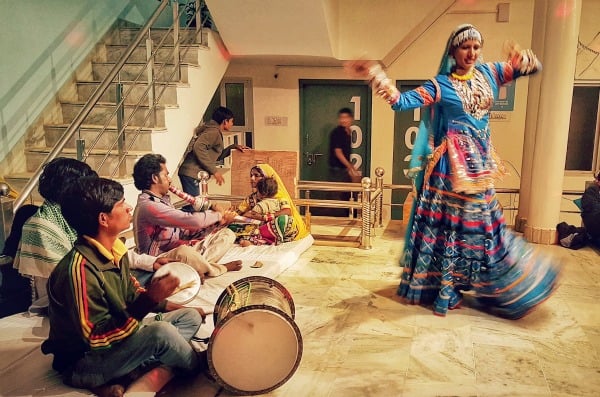 Zostel pioneers a new concept in a hip, fun, luxury hostel chain in India and Asia
Zostel pioneers a new concept in a hip, fun, luxury hostel chain in India and Asia